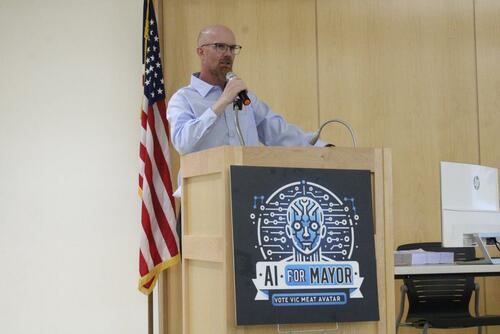Authored by Andrew Singer via CoinTelegraph.com,
Artificial intelligence could soon be governing a city in the United States — at least if one American mayoral candidate has his way.
Victor Miller recently threw his hat into the ring for mayor of Cheyenne, Wyoming, pledging to manage the 65,000-person city exclusively with a generative AI bot he built himself — called VIC, or Virtual Integrated Citizen.
He argued that it could quickly scan heaps of municipal documents, summarize events and render error-free judgments in near real-time. Its rulings would also be objective — without fear of favor or influence from lobbyists — which would be good for democracy.
Tech-savvy Wyoming is arguably the most crypto-friendly state in the United States, so maybe it’s fitting that its capital city also has the first AI political candidate.
AI governance is “highly irresponsible”
However, some scientists and even AI practitioners are aghast at the prospect of outsourcing local government to an AI-enhanced bot.
“AI should be considered a tool that we can use to help government services run more efficiently, not take over entirely,” Terrence Sejnowski, professor in the Department of Neurobiology at the University of California at San Diego and a researcher on the intersection of AI and neuroscience, told Cointelegraph.
Even if the AI bot’s decisions were accurate, there would still be non-routine cases brought to City Hall that are beyond the realm of a bot’s training data.
“This became apparent with self-driving cars, which have no problem with 99.9% of the decisions a driver has to make but struggle with unusual edge cases,” Sejnowski commented.
Often these involve unique individual cases, the sort that have traditionally been settled by courts and lawyers. That shouldn’t change, in Sejnowski’s opinion.
“It would be highly irresponsible at this point in time to use generative artificial intelligence for any moderate-to-high risk decision-making in government,” Julian Cardarelli, CEO of GovCore, a government tech firm, told Cointelegraph.
“I would rule it out entirely for anything that requires an informed decision to be made with such a risk profile.”
Still, in his view, some low-risk government functions could safely be taken over by generative AI software programs, such as processing social assistance claims or renewing licenses and permits (drivers, hunting, fishing, firearms, etc.).
Also, tax calculation and collection, “and any other transactional function of government where there isn’t a risk of physical harm or injury,” Cardarelli added.
Is candidate Miller for real?
So, what is one to make of Cheyenne mayoral candidate Miller? Is this all just an election gimmick?
According to a Washington Post interview with the candidate, Miller sees himself as a path-breaker for the “untapped potential of artificial intelligence in government.”
His light-bulb moment occurred this spring when the city “erroneously” denied him a public records request, a decision later reversed. But an AI bot might not have made that initial mistake, he reasoned.
“I started wondering if AI would make a better mayor than any human,” Miller told the Washington Post. He created a program using ChatGPT 4.0 and “fed it city ordinances and related documents. He found that the bot could swiftly recall public-records laws and make decisions on issues like funding new city construction or fixing potholes,” reported the newspaper.
Miller campaigning. Source: Morning Brew
“This incident in Wyoming seems to be testing the frontiers of local regulation,” Valerie Wirtschafter, an AI researcher at the Brookings Institution, told the Post.
Elsewhere, Eyal Darmon, North American public service generative AI lead for IT consulting firm Accenture, has said that AI really could make a difference in governments around the world.
Indeed, more than 50% of government activities could one day be “disrupted” by generative AI, he told Government Technology.
“AI is not there yet”
Is Miller really on to something, then?
Chris Rothfuss, an engineer by training, is the senate minority leader of the Wyoming State Legislature. He also co-chairs the legislature’s Select Committee on Blockchain, Financial Technology and Digital Innovation Technology.
“In my view, AI is not there yet,” Rothfuss told Cointelegraph.
“It is not well enough developed that one should even think about ceding the sort of control Miller is talking about — even if it were ethical — which it’s not,” he says.
“It’s not a good idea.”
Not long ago, Rothfuss and other members of the select committee attended an AI workshop at Stanford University to learn more about AI and government.
Other local and state governments are now experimenting with AI models, including projects in which the computer algorithm would be the final decision-maker.
These included decisions that could harm an individual’s welfare, such as whether to shut off Medicare or Medicaid payments.
These rulings were being made automatically by a bot, with no final review by a human being.
“I don’t want that in the future,” Rothfuss told Cointelegraph.
“The main areas we wouldn’t want to turn over are executive decisions, legislative decisions and judicial decisions,” added Cardarelli. “Those are high-risk functions.”
AI eliminates errors and makes faster decisions
But that doesn’t mean that bringing AI into the mayor’s office is necessarily a bad idea — just that it shouldn’t be alone in the office, i.e., it should assist the elected Mayor and others.
Summarizing long documents such as “municipal minutiae” for human users “would certainly create manifold improvements in efficiency,” said Cardarelli. Also, writing presentations and documentation materials, briefing notes, meeting minutes, summarized video calls and so on.
“This kind of effort is very labor intensive for human beings, and AI can get it done in near real-time, said Cardarelli.
It could also lead to fewer errors in local government — the sort that outraged candidate Miller. “We know that there is a wide degree of variability of output when humans conduct this work,” said Cardarelli. That is not the case with AI, which is very consistent with this kind of work.
High-risk decisions — the sort AI should be kept away from — comprise only 20% of local government, roughly speaking, while the other 80% is administrative and ripe for disruption, in Cardarelli’s estimation, adding:
“I think we should be very bold about the potential to create a hyper-efficient, digital government model that drastically reduces inequalities and radically improves access to services.”
AI as a social worker
One strength of the modern age is that waves of innovation spread quickly around the world.
Regarding AI and local governance, the city of Sydney, Australia, is using AI to enhance the review process for Complying Development Certificates. The city can receive as many as 30,000 applications a year, and in the past, the review process “was marred by inconsistencies and delays,” reported law firm DLA Piper, adding:
“With this AI-driven method, applicants more quickly receive a preliminary assessment, thereby streamlining submissions and boosting the efficiency of the planning department.”
Elsewhere, the transport department in the Australian state of New South Wales is exploring the use of AI to develop “real-time diagnostics of road conditions, paving the way for proactive maintenance.”
Indeed, many have yet to appreciate the sheer breadth of local or state government functions that could be eventually improved by AI. “One that may not come to mind is social services, where empathy is needed,” said Sejnowski, adding:
“AI has been proven to have better empathy than most doctors and is preferred by patients for psychotherapy. No need to wait for a social worker when AI can see you now.”
Rothfuss would oppose using AI as final authority for any decision that could potentially cause human suffering, like cutting off the gas to a person’s house. Those sorts of orders will always require human review. By comparison, a decision whereby an individual gains something, like a reduction in a tax assessment, could be fully automated at some point, according to the state senator.
Need for AI regulation
Sejnowski observed that the Industrial Revolution created tools that greatly enhanced our physical power. The information age has magnified our cognitive power manyfold. “In both cases, people have to decide how to use the tools.”
That’s really the nub of the problem. “The tools can also be misused, so we need to regulate them,” Sejnowski explained. So maybe the questions about AI and government need to be reframed along the lines of, “Ask not what AI can do for you, but what you can do to make AI safer,” he told Cointelegraph.
“The potential is enormous,” added Cardarelli.
“We are at the very, very early stages of this transformation,” a process that could take 20–30 years to fully unfold.
“But at the end of it, we could reasonably expect to find ourselves with a new kind of government that is more democratic because it is efficient, effective and fair,” he said.

